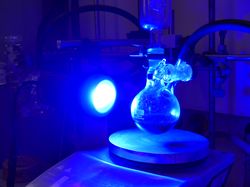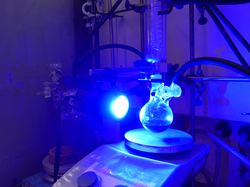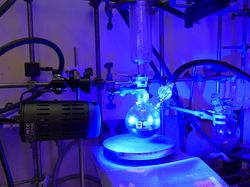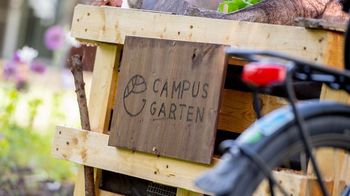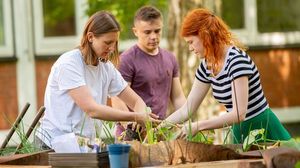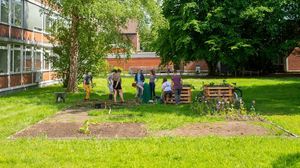Study Coordinator
dr. sc. Iva Bacic

Innovative Teaching and Study Concepts
Inquiry-based Learning: Photochemical Reactions in Inorganic Chemistry
- engage with current research literature: This involves locating relevant literature, critically reviewing it, and thereby becoming familiar with the latest developments in inorganic photochemistry.
- developing their own research question in this field, selecting appropriate research methods, and preparing the laboratory setup.
- applying the chosen method and conducting experiments.
- observing chemical phenomena in the laboratory and interpreting the results accurately.
- learning to express themselves academically: Presenting the project idea briefly at the beginning of the module during the working group seminar of Prof. Müller's research group, summarizing the work done including the obtained results in a final report, and presenting it in a 20-minute presentation within the research group.
Here, of course, the principles of good scientific practice are followed. Thus, this module provides a space where questioning and skepticism can be tested and learned, and where one's own results are generated and analyzed to draw scientifically sound conclusions.
The endeavor is supported by forschen@studium, a programme aimed at promoting activities related to inquiry-based learning at Carl von Ossietzky University Oldenburg.
Explorative Learning: The Campus Garden – A Multi-Perspective Learning and Working Environment
- Markus Allbauer-Jürgensen is a staff member at the Institute for Economic Education in Faculty II – Computer Science, Business and Law.
- Svenja Jessen is a staff member at the Institute for Material Culture in Faculty III – Language and Cultural Studies.
- Dr. Michael Peetz is a staff member at the Institute of Chemistry in Faculty V – Mathematics and Natural Sciences.
- Dr. Birgit Weusmann is a staff member at the Institute for Biology and Environmental Sciences in Faculty V – Mathematics and Natural Sciences.
Zusammen haben sie ein neues Modul konzipiert , das zum ersten Mal im WiSe2023/2024 im Professionalisierungsprogramm für Studierende mit dem Berufsziel Lehramt / Zwei-Fächer-Bachelor-Studiengang angeboten wurde und welches auch in diesem SoSe2024 erfolgreich gestartet hat. Im Fokus des Moduls steht das Querschnittsthema Bildung für nachhaltige Entwicklung (BNE) mit einem praktischen Bezug zum CampusGarten* auf dem Gelände der Universität. Bildung für eine nachhaltige Entwicklung ist das Leitkonzept u.a. für Nutz- und Zierpflanzenbau auf dem Unigelände, hier stellvertretend für Schulgarten bzw. Schulgelände, die als Lernraum für den Umgang mit natürlichen Ressourcen, unseren Mitgeschöpfen sowie Mitmenschen dienen. Die Herkunft unserer Lebens- und Genussmittel sowie weiterer Pflanzenprodukte werden unter BNE-Perspektive und damit auch interdisziplinär betrachtet.
Together, they have designed a new module, pb423 - The CampusGarden - a mutlifaceted learning and working environment, which was offered for the first time in the winter semester 2023/2024 as part of the professionalisation programme for students aiming for a teaching profession / dual-subject Bachelor's degree. This module also successfully commenced in the summer semester of 2024. The module focuses on the interdisciplinary theme of Education for Sustainable Development (ESD) with a practical connection to the Campus Garden* on the university grounds. Education for Sustainable Development serves as the guiding concept for, among other things, the cultivation of edible and ornamental plants on the university campus, representing school gardens or school grounds as learning spaces for managing natural resources, and interacting with other living beings and fellow humans. The origins of our food, beverages, and other plant products are examined from an ESD perspective and thus also interdisciplinary.
* The Campus Garden on the university grounds is an initiative of the student body under the AStA Sustainability Department. It was established in early 2022 and has since been managed exclusively by students.
Forschendes Lernen als Grundstein des Seminars im Rahmen des Moduls pb423
In designing the module and its associated seminar, the focus was placed on research-based learning. The students not only cultivate garden produce themselves and engage with the opportunities and challenges of working on school grounds: in self-developed and presented projects, they can also demonstrate the application of specific fertilisation methods, decomposition processes, and the tracing of production and transport processes. However, since the students are still in their Bachelor's studies, completely independent research is not a requirement for passing the module. By not assigning grades, individual levels of experience in the interdisciplinary approach can be taken into account.
The planned structure of the seminar is as follows:
forschen@studium
Learn more about:
- the Campus Garden: https://uol.de/aktuelles/artikel/ein-garten-fuer-alle-6390
- the module pb423: pb423 - The Campus Garden - a multifaceted learn and working environment
- the programme forschen@studium: forschen@studium


